

Imagine transforming your love for gaming into a bustling source of financial freedom. Unbelievable? Perhaps. But gamers worldwide are cashing in large checks, and it's happening faster than you'd think.
With the world increasingly shifting online, the gaming industry is booming like never before. It's no longer just about playing; it's about thriving in a world where pixels bring prosperity. But only those who know the secrets can turn their passion into profit.
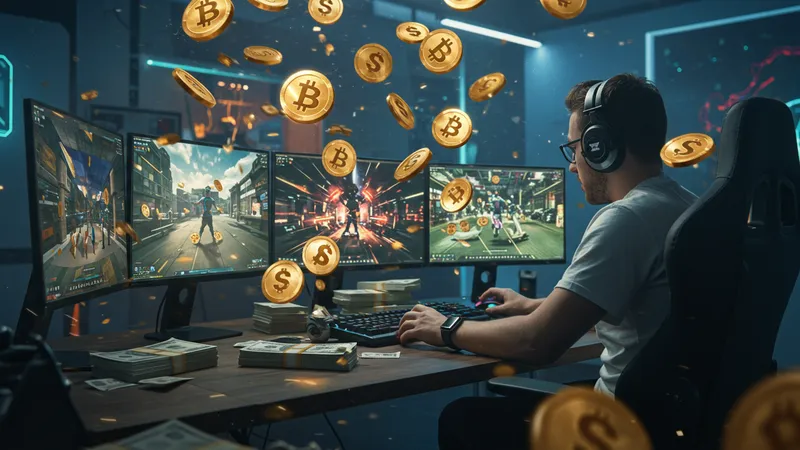
Did you know that some gamers earn more than bankers? Ryan’s World, a seven-year-old, brought in $26 million in a year just through YouTube, reviewing toys and games. But that’s not even the wildest part… There’s a subculture of gamers monetizing their skills in unexpected ways, from virtual real estate to trading rare in-game items for eye-watering amounts.
Then there's the enigma of gaming academies, grooming future Esports stars, promising fame and wealth to those who dare to dream. Even traditional education systems are beginning to recognize the economic worth of gaming. But that's not where it ends…
What's unfolding next is a revelation even industry veterans couldn't foresee. These once-hidden figures are becoming mainstream legends, turning the conventional gameplay narrative on its head…
In the past decade, we’ve seen an explosion of gaming moguls, individuals who have effectively built empires from their gaming passions. Wealthy Twitch streamers like Ninja pull down millions yearly, and their audience base just keeps growing. What you read next might change how you see your late-night gaming sessions forever. The trick lies in audience engagement—personal branding is as critical as game skills, but most players overlook this crucial element.
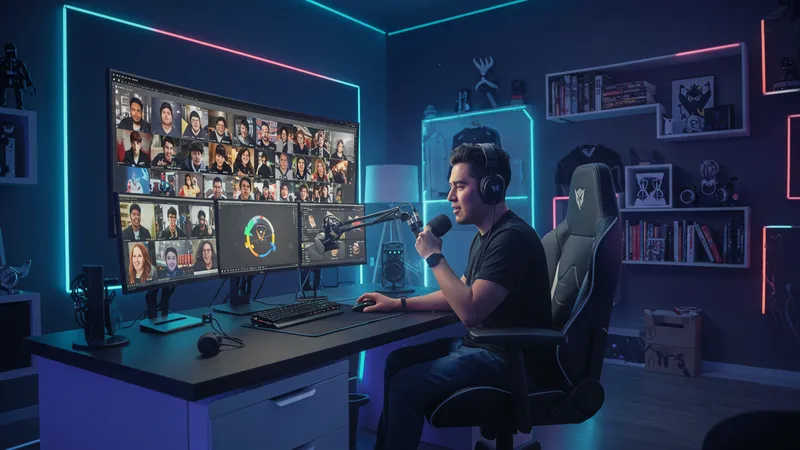
For many, the path to gaming mogul status starts with consistent, charismatic streaming. This involves mastering platform algorithms, fostering a loyal fanbase, and capitalizing on gaming merchandise sales. But there’s one more twist—successful gamers are branching out, turning their online fame into book deals and TV interviews. It’s a multi-faceted industry, but few aspire to explore these avenues.
While the digital hustle is commendable, few are aware of the staggering endorsement deals these gamers secure. Partnerships with tech giants like Logitech and Razer can result in lucrative contracts. Think beyond the controller—gamers today are more akin to cross-platform influencers. Yet, it’s not enough to be good at gaming; knowing how to negotiate these deals is just as vital.
But those aren't the only hidden revenue streams. Did you ever imagine investing in virtual properties? In the metaverse, gaming tycoons are buying and flipping digital real estate for enormous profit margins. What happens next is likely to redefine digital capitalism as we know it…
Virtual economies are the financial Wild West of our era. Games like "Fortnite" and "World of Warcraft" have seen their in-game currencies become valuable commodities, traded for real money on the outskirts of financial legality. But most surprising is the degree of complexity involved—these economies operate with the same fundamental rules as their real-world counterparts, often with fewer regulations.
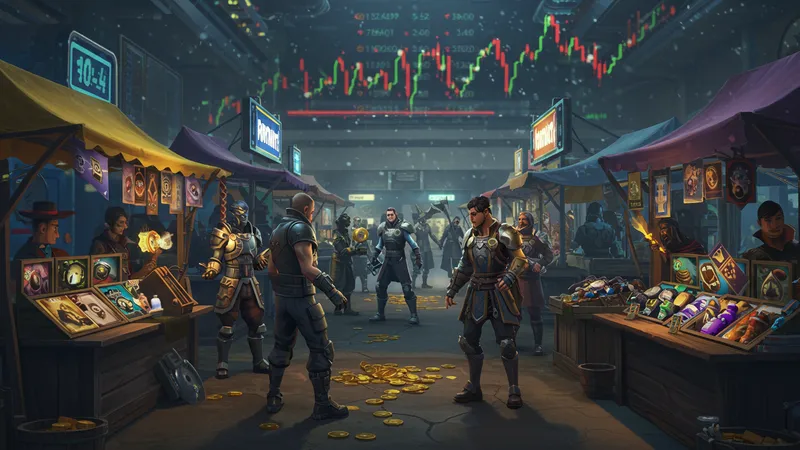
The thing about virtual economies is that they offer a unique opportunity—the potential to earn actual income, free from a nine-to-five grind. Yet many players remain oblivious to the financial windfalls possible. Mastery of the virtual marketplace requires strategic thinking, and it’s not without its pitfalls. But there’s one critical piece of advice seasoned players won’t share: it’s all about timing your sales during in-game events when demand peaks.
What’s groundbreaking is the increase of financial literacy programs tailored for gamers. Knowing taxes around virtual earnings or gaming scholarship opportunities could change everything for aspiring gaming entrepreneurs. But there's another surprising angle—legitimate financial advisors are stepping in to help gamers manage wealth. This phenomenon could genuinely change perspectives on 'screen time'.
There’s still a vast, untapped market of digital avatars waiting to be explored and exploited for profitability. And as the metaverse expands, more avenues lain dormant will awaken into thriving economies. The storyline that follows could surprise even the most savvy of investors…
Gaming doesn’t just pay in pixels—it translates into desirable real-world skills. The problem-solving abilities, strategic planning, and teamwork gamers develop can be invaluable in the workplace. Yet remarkably, many don’t see gaming as a resume booster. Some major companies are beginning to value these skills on par with traditional qualifications. Surprisingly, giants like Deloitte have set up recruitment drives within gaming communities.

Dedicated gamers find themselves seamlessly fitting into tech roles, tapping into their analytical skills and adaptability. More than ever, companies are recognizing the transferable skills honed by years of gaming. But the big news? Entrepreneurial thinking fostered in competitive gaming environments is now dictating the strategies of famous CEOs. This revelation ushers a new perspective on gaming's underestimated potential.
The idea of gaming as a career stepping stone seems radical to many, but it’s becoming increasingly viable. Networking within gaming circles can lead directly to high-paying jobs, spanning from virtual reality design to eSports management. What makes this shift unbelievable is the scale at which this adaptation is emerging.
But there’s a bigger surprise—a growing number of educational institutions now offer courses and degrees in gaming studies! From masters programs in game theory to technical design certifications, the ‘Game Over’ screen has never seemed more misleading. What you’re about to discover next might alter your perceptions of higher education forever…
Education systems are undergoing a dramatic transformation—largely thanks to the influence of gaming. Alternative learning paths and gamified education models have shown promising results in enhancing student engagement and comprehension. The integration of gaming in educational curriculums no longer faces the skepticism it once did.
What’s fascinating is how video games are helping teach complex subjects, from physics to history. Platforms like Minecraft Education Edition are breaking new ground, illustrating that interactive learning holds more promise than traditional classroom methods. The most astonishing part might be how entire degree programs are now embracing the gamification of education to prepare students for tech-driven futures.
This trend is further spilling over into the way corporate training is being reinvented. As businesses modernize with tech-savvy staff, gamified learning management systems are being adopted by Fortune 500 companies to onboard and train employees effectively. This shift marks a significant paradigm shift where education and entertainment find harmony.
Most unexpected is how educational gamification is redefining exams and evaluations, moving from rote memorization to more interactive assessment techniques. With this change on the horizon, the education landscape won't just change—it will evolve into a dynamic nexus of learning. What happens next will likely overtake any expectations…
In this new gaming-led economic landscape, community building is key. The camaraderie amongst gamers isn’t just social; it’s evolving into powerful professional networks. Guilds are becoming as essential as LinkedIn connections, proving that community-backed projects flourish exponentially.
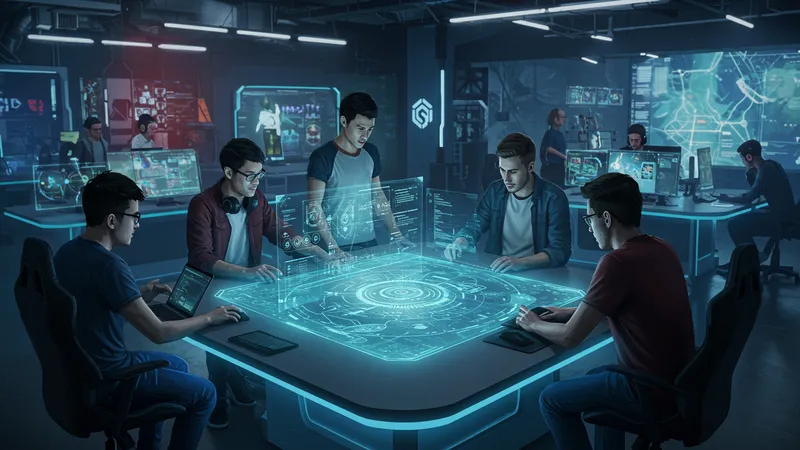
Did you know online collaboration in gaming communities is breeding innovation? Indie game development teams harness the power of collaboration, with productivity reaching new heights. Who would have thought game nights could double as productive brainstorming sessions leading to the next bestselling app?
The eco-system of community play isn’t limited to production value. Gamers are innovating philanthropy through charity streams and community fundraisers, directly impacting global issues. With the synergy of mission-driven play, these altruistic ventures are transforming the narrative of gaming's societal role.
Yet, what’s left largely unsaid is the business potential of tight-knit communities that rally around dedicated game causes. Through combined effort, gamers are influencing significant societal changes—potentially more winsome than we could imagine. But there’s another angle: quirky alliances are changing face-to-face meetups into globally recognized conventions. This unexpected turn redefines the gaming sphere—one connection at a time.
Startups originating in the gaming world have become the latest Cinderella stories. With the market ripe for innovation, these startups are creating products and solutions that span far beyond the console. What’s critical here is the entrepreneurial daring, from virtual reality solutions to groundbreaking digital assets.
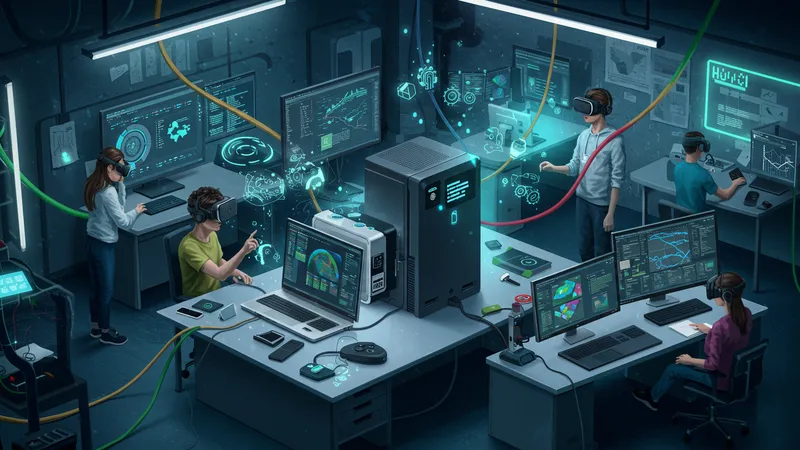
Commonly underestimated, gaming startups have shown that their market does not just lie within gaming itself, but stretches across technology, business solutions, and even sustainable initiatives. Take Razer for instance, which began with gaming peripherals, evolving into a complex tech company. What could be next on the horizon for these underdog startups?
Fueling this growth are investment opportunities that were unthinkable a decade ago. Crowdfunding platforms have become a lifeline for gaming startups, with successful projects catapulting into the limelight overnight. But the key to their success lies in one crucial element: understanding gamer needs intimately, something larger corporations sometimes miss.
There’s another surprising layer—gaming startups are diving into adult e-learning, with customized courses that defy traditional education norms. This diversification trajectory suggests that gaming platforms might yet dominate sectors unforeseen. With each progressing innovation, the storyline keeps unfolding further…
Success in the gaming industry is no longer just about sales figures or high scores. It’s about influence, innovation, and the ability to connect massive audiences with new technologies. As gaming evolves, the definition of success within it changes in tandem, offering a model other sectors might strive to follow.
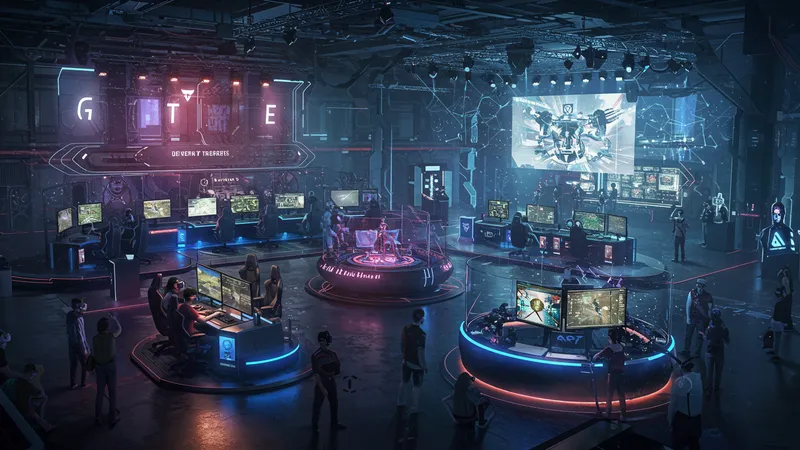
Yet, what most don’t perceive is how future-facing gaming companies are setting benchmarks for other industries, teaching valuable lessons on agility and community orientation. The former niche industry is now a vanguard of innovation, encouraging cross-sector collaboration like never before.
Perhaps most astonishingly, it’s not just programmers or moguls who define success. Creative talents—storytellers, artists, and musicians—are finding new avenues to channel their crafts. The convergence of these talents has added a unique depth to gaming narratives, propelling them to the forefront of pop culture. This integrated approach may soon inspire revolutions in how television and movies are produced.
The trajectory is clear: the ever-evolving definitions of success in gaming evaporate traditional limits, inviting everyone to participate in this digital renaissance. Opportunities are boundless, and as sectors intertwine, the most exciting part hasn’t even begun to unravel…
The collision of blockchain technology and gaming platforms is paving the way for unparalleled opportunities. Blockchain offers gamers a new method to claim ownership-rights over virtual assets, giving rise to play-to-earn models where players truly own what they gain in games.
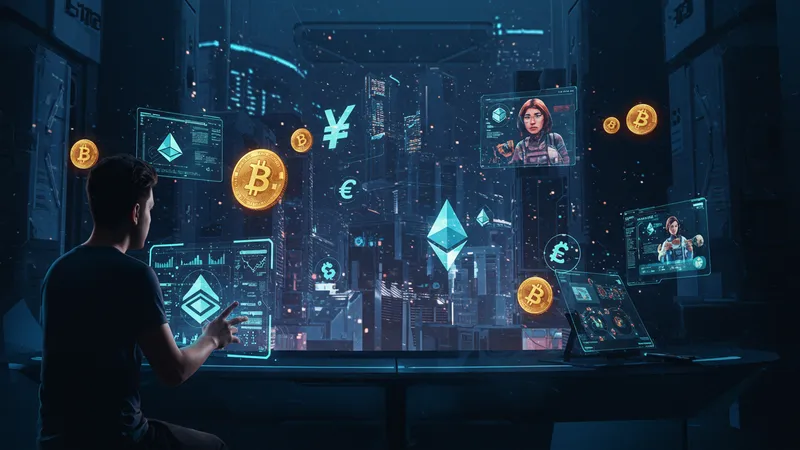
Cryptocurrency in gaming has revolutionized in-game economies, with players trading characters, skins, or artifacts as NFTs (Non-Fungible Tokens). High value seven-figure transactions of these digital assets aren’t uncommon today. Yet an even more shocking reality is how traditional financial institutions are considering these crypto-assets’ legitimacy.
The advent of decentralized finance (DeFi) is giving rise to play-to-earn games where players can gain tangible returns. Next-gen games are transforming how value is perceived by assigning worth to virtual efforts. This era of digital currencies converging with gaming could arguably transform finance itself.
Perhaps, most surprisingly, authorities embracing these technologies are ensuring a more regulated, fair digital market. While critics question these moves, it’s hard to ignore their potential to balance gaming ecosystems ethically. But keep reading—even within this transformative age, there are more revolutionary shifts yet to unfold…
AI is not merely reshaping gaming experiences; it’s revolutionizing them. Intelligent game worlds with adaptive characters provide tailor-made player experiences that were once the stuff of legends. What’s more impressive is AI’s role in challenging and engaging players, offering uniquely customized difficulties.
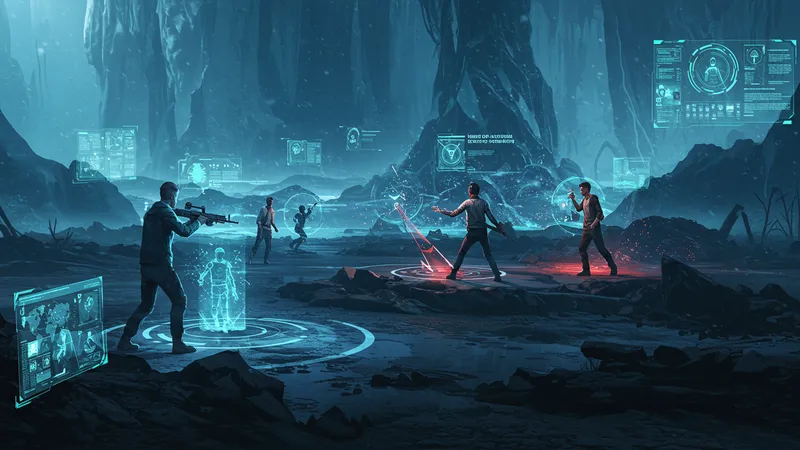
The breakthrough here is intelligent NPC behavior that reacts in real-time, learning and adapting to player strategies. This dynamism results in unparalleled immersion but raises a game-changer issue—how close are we to seeing AI-created narratives that transcends human storytelling? Could gaming AI unlock storytelling potential as never experienced before?
Beyond gaming, AI integrates into game development, optimizing designs, reducing inefficiencies, and predicting market trends. Some might even argue that proficient use of AI is becoming foundational for thriving game developers today. One more twist in this story—AI applications in gaming might eventually challenge our understanding of creative self-expression.
Such sophisticated integration of AI into gaming signifies an evolved narrative ecosystem. But, a different, even more intriguing frontier looms on the horizon. Stick around to discover where this technological marvel might lead next…
Welcome to the Metaverse—gaming’s ultimate frontier, a digital universe where reality and fantasy blend into an interactive mythos. This burgeoning realm promises boundless engagement opportunities for gamers and non-gamers alike. Here’s what makes it revolutionary: the sheer interconnectedness between diverse digital ecosystems.
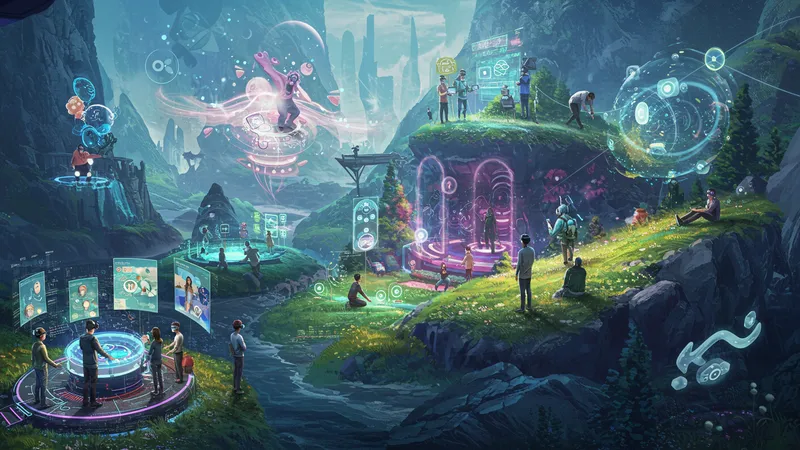
Beyond being a virtual playground, the Metaverse provides viable living spaces for community-building, business ventures, and social interactions. The line between game and life blurs, transforming how people work, play, and connect, fostering an era of digital-nomads. The idea was once an elusive dream, but now leading tech companies like Meta are betting on mastering this digital expanse.
Behind the scenes, architects and developers are wielding pioneering technologies, laying the groundwork for this multiverse. Their creations will redefine norms, challenging us to contemplate how we might digitally coexist. Collaborative creativity here isn't just desired—it’s essential.
Despite its promises, the Metaverse faces hurdles, from ethical concerns to tech accessibility. Navigating this digital expanse requires protocols yet untested by time. But perhaps the biggest twist is that these challenges suggest something far more intricate awaits beyond what the Metaverse currently offers. Keep exploring, as the final act is yet to unravel…
Esports isn’t a flash in the pan; it's a full-fledged competitive arena racing toward mainstream acknowledgment. The scale of global competitions, coupled with soaring viewership figures, firmly positions Esports in the heart of the entertainment industry. However, what’s most striking isn’t the numbers—it’s the sheer scope of possibility within this digital sporting discipline.
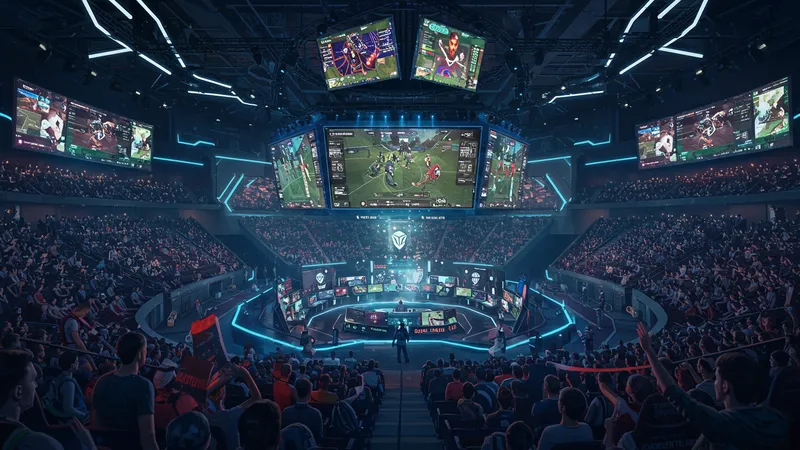
The economic impact of Esports extends beyond prize pools and sponsorships. Fringe sectors—like travel, hospitality, and media—flourish alongside Esports, fostering powerful synergies that fuel its growth. Yet, another industry-shaping trend is emerging: the marriage of traditional sports leagues and Esports events, creating collaborative circuits that enchant wider audiences.
Curiously, there’s an emerging cultural blending within Esports, transcending geographical barriers to unite disparate fanbases. Their shared love of games encourages cross-cultural exchange in unprecedented ways. Case in point: international tournaments marshalling fans from diverse backgrounds. Are we witnessing the dawn of a revolutionary cultural phenomenon?
The potential of Esports is untapped—it could spearhead shifts within entertainment, technology, and culture while propelling economies forward. From grassroots community initiatives to glitzy championship events, its path will undoubtedly shape stories for generations. But, as Esports continues its meteoric rise, let's unravel one more unexpected evolution…
Gaming’s role in mental health has seen profound shifts—promising and concerning alike. Video games serve as effective tools for stress relief, providing escapades where players momentarily drap themselves from life's daily realities. In these fantastical worlds, a sense of accomplishment and belonging fosters resilience, energizing players precisely when needed.
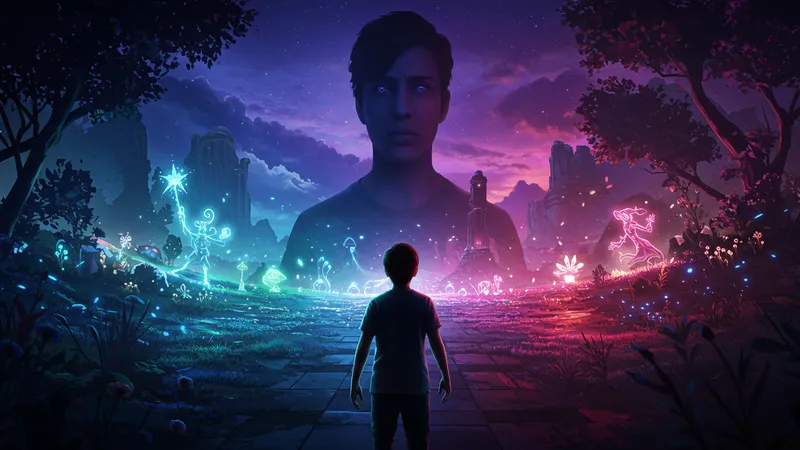
However, there’s a flip side. Media-fueled concerns over gaming addiction highlight potential mental health threats. The line between healthy engagement and compulsion can blur, leading to debates about balancing gaming habits. Navigating safe digital boundaries transcends individual efforts, demanding community and parental involvement.
Beyond challenges, clinical investigators are championing the therapeutic power of gaming for treating mental health issues—specifically PTSD, anxiety, and depression. Innovative applications demonstrate how thoughtfully constructed experiences can evoke healing, bringing new credence to gaming’s positive influence.
Surprisingly, support networks are burgeoning within gaming communities, creating a thriving environment for mental health advocacy. These communities encourage open dialogue and support mental well-being, amplifying the notion that gamer's welfare influences gaming's evolution. But this is just one facet of a broader narrative—discover how these impacts redefine societal norms…
Gaming isn’t just influencing society; it’s catalyzing meaningful change within it. As digital realms become spaces of community, equality, and activism, gaming’s functions outshine mere entertainment. At their core, games offer arenas to explore cultural narratives, empathize with diverse personas, and engage in dialogues that necessitate empathy.
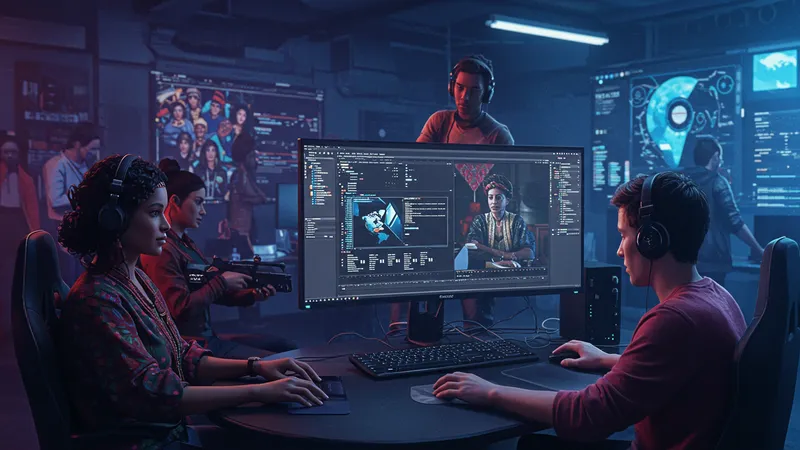
Some wonder, can gaming bridge socio-economic divides? Indie developers, empowered by accessible technology advancements, forge narratives spotlighting minority perspectives and underrepresented voices. Coupled with platforms championing inclusivity, they’re reshaping industry dynamics. This unprecedented accessibility to storytellers fuels movements for change.
Alternative realities crafted in-game hold the potential to spark real-world actions, from environmental conservation drives to fundraising for global crises. Gaming's unparalleled reach creates fertile ground for activism, influencing societal motivations immensely. But one of the most transformative insights is how gamers globally unify for altruistic endeavors, altering long-standing stereotypes.
However, the greatest impact emerges by fostering empathy, encouraging participants to test boundaries of their consciousness, and envision new possibilities. This imaginative capability positions gaming as a frontline agent for social evolution, facilitating humanitarian change throughout digital spaces. Continue onward to discern how these realizations unfold in the culmination of this tale…
The migration towards an environmentally sustainable gaming industry exemplifies innovation meeting responsibility. Cutting-edge technologies and practices aim to lower carbon footprints, with developers prioritizing energy-efficient processes. What’s more, bringing gamers onboard in this ecological awakening represents an ingenious development—one that may redefine how industries shift toward eco-conscious approaches.

So, what makes eco-friendly gaming so unprecedented? It leverages collective community efforts alongside technology, reinforcing commitments to combat climate concerns. From harnessing green server farms to promoting conservation-conscious consumerism, sustainable gaming initiatives display a commitment to planet-positive impacts.
A surprising front emerges within these innovations: eco-conscious players forming alliances around eco-action challenges to raise awareness and influence broader change. Through playful interaction, sustainability-conscious games inspire eco-awareness across audiences, generating ripples far beyond virtual domains.
What’s left undisclosed is the potential partnership forging between environmental organizations and gaming companies. Collaborative endeavors foresee development strategies accentuated by sustainability measures that transcend gaming, with influence permeating international boundaries. As the final pages reveal, this shift uncovers unforeseen lessons beyond our contemplations…
The story of the gaming industry, at its heart, is the story of individual empowerment. Today, virtually anyone can claim a stake as a gaming trailblazer—whether through streaming, game creation, or any digital culture facet. This empowerment spawns from accessible technology transforming players into creators and consumers into producers.
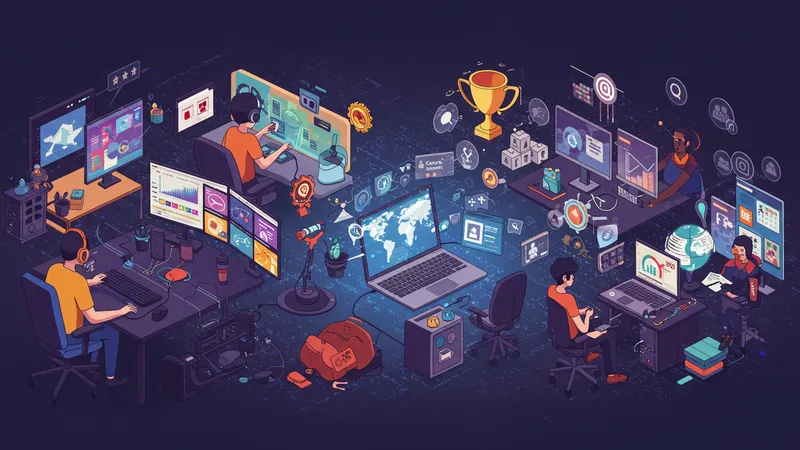
The rise of community tools, open-source software, and DIY game engines have democratized an industry, once solely governed by elite developers. Venture capital ventures, scholarships, and sponsorships further extend players' potential. Single players channeling creativity can enter global markets and compete on an equal playing field.
One often overlooked nuance is how marginalized voices find a platform to be heard within the gaming sphere. Diversity amplifies when individuals bring their stories to life—an empowerment fuel-train long underestimated, now pivotal to rich narrative environments. This act reverberates through genres, shaping more inclusive realities.
But as barriers to entry disintegrate, the need to foster ethical empowerment emerges. Gamers hold responsibility not just to enjoy, but to contribute thoughtfully—reshaping gaming’s impact in holistic ways. What the final revelations indicate could surprise even the most astute thinker…
The metamorphosis of game development marks an unprecedented era. Technological advances reshape how creators conceive and execute visions, pushing the boundaries of reality and creativity. Today’s developers encompass diverse backgrounds—artists, programmers, musicians—collaborating in harmonious symbiosis.
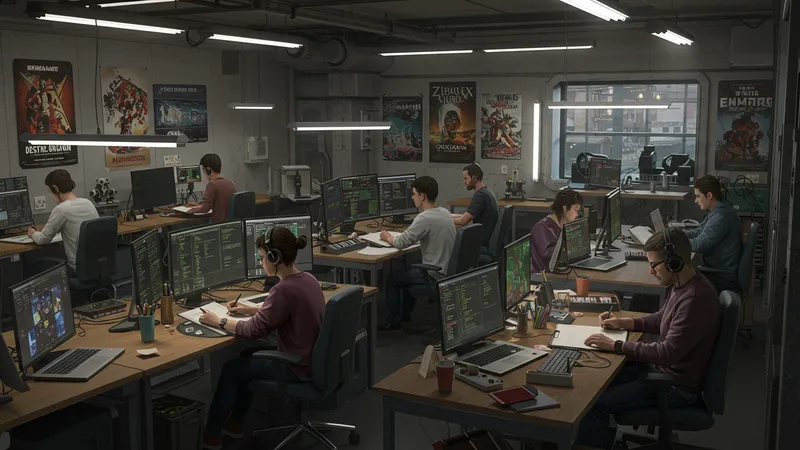
No longer is development constrained by immense budgets or large teams—indie developers usher in a wave of innovation, their works pioneering new mechanics and storytelling. What defies expectation is the rising tide of community-developed games fueled by passionate players-turned-creators. These unconventional teams challenge norms while transforming narratives.
The proliferation of development platforms and tools enables these creators to leap into the industry from the comfort of their homes. Hence, a unique paradigm surfaces as big publishers increasingly recognize their talent and market potential, fostering symbiotic relationships that blossom into successful collaborations.
But even with these advances, what truly redefines the game development landscape is inclusion. The shift towards reaching untapped markets fosters diversity and represents gaming's journey towards unifying storytelling. The transformative processes stretching from mental maps to tangible creation will forever redefine our understanding of gaming evolution…
As we unravel the vast possibilities within gaming, a resounding truth echoes: gaming is the springboard of futuristic realms. It interconnects creativity, culture, economy, and community in ways unheard of until now. More than just pixels, these legacies etch imprints upon reality, magnifying via virtual experiences. It’s more than a game—it’s a movement, a digital tapestry weaved from collective imagination, pointing toward boundless futures.
Are you inspired? Dive deeper, indulge in this boundless phenomenon, and join fellow trailblazers in this revolutionizing journey. Share the tale of gaming’s undeniable renaissance. Bookmark it, spread it, and become part of a narrative that defies confines. Your exploration ignites evolution, so set forth, and let discovery light the way.